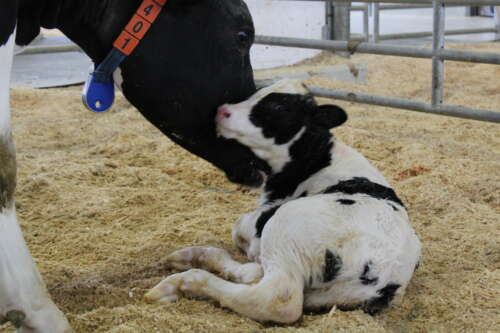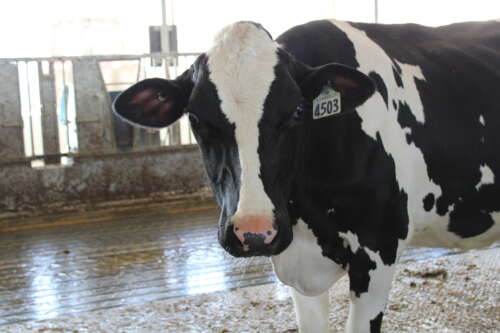
Improved human, animal and environmental health is the goal of a $12-million, University of Guelph-led international genomics project expected to revolutionize breeding in Canada’s multibillion-dollar dairy farming industry.
The four-year project will be the first large-scale project integrating novel genetic traits for fertility, health and feed efficiency into a national database to help farmers and breeders, said U of G animal biosciences professor Christine Baes, who is leading the project.
Genome Canada will provide $4 million toward the project, and $3 million will come from regional genome centres: Ontario Genomics (including the Ontario Research Fund), Genome Alberta, Genome Quebec and Genome British Columbia.
“Ontario Genomics is grateful for the Ontario government’s support for this important genomics dairy farming project,” said Bettina Hamelin, president and CEO of Ontario Genomics. “Genomics tools and technologies are revolutionizing how we breed healthier and more resilient livestock, which is great news both for farmers and consumers. By investing in Ontario’s prominent and leading genomics research and innovation, we are making certain that Ontario’s agriculture and agri-food sectors thrive while contributing to a healthier planet and healthier people.”
Mike Harris, MPP for Kitchener-Conestoga, said this provincial investment will lead to a sustainable, more competitive Canadian dairy industry.
“This innovative project will help build a stronger agricultural sector and food system in our province.”

The project will also receive funding support from Lactanet Canada – a partnership launched in 2019 by Quebec-based Valacta along with CanWest DHI and the Canadian Dairy Network, both based in Guelph – as well as companies and organizations in dairy genetics and production, including Growsafe, Allflex, Afimilk, NEDAP and Illumina. The project also involves collaborators in the United States, Europe, Brazil and Australia.
The project builds upon the world-class platform created for dairy research at U of G through its partnership with the Ontario Ministry of Agriculture, Food and Rural Affairs (OMAFRA), the Ontario Agri-Food Innovation Alliance, said Malcolm Campbell, vice-president (research).
“The generous support from government and industry partners across Canada will enable U of G researchers to collaborate nationally and globally on projects that will benefit dairy farmers and dairy consumers alike, with phenomenal environmental and economic benefits,” he said.
“This initiative is yet another example of how University of Guelph researchers connect many disciplines to find solutions that promote healthy populations, healthy ecosystems and a healthy economy that collectively improve life.”
Project members aim to identify novel genetic traits for a new selection index for dairy cattle resilience. Baes said the group will develop traits that help animals adapt to changing environmental conditions while maintaining milk productivity, dairy herd health and cow fertility – all in a way that feeds people and protects the environment.
The results will directly benefit farmers and cattle breeders, helping them to identify superior livestock for breeding, said Baes. She said the system will ultimately help farmers save some $200 million in costs associated with poor cow fertility and disease, as well as animal feed that makes up the largest expense in milk production.
The new project is intended to satisfy growing consumer demands and ensure the competitiveness of Canada’s dairy industry. It’s also meant to help address increasing concerns about human health, animal health and welfare, and the environmental impacts of greenhouse-warming methane emissions as well as water, energy and land use.
“This project can address key challenges that the industry is facing, enhance sustainability of dairying and provide a long-term competitive advantage for Canada’s dairy industry,” said Baes, who holds the Canada Research Chair in Livestock Genomics.

Baes leads the initiative along with co-principal investigators at the University of British Columbia, the University of Alberta and Université Laval. Other Canadian partners include researchers at the University of Prince Edward Island and at companies and industry organizations across the country.
About 40 U of G researchers, including eight faculty members and numerous staff and student researchers from the Ontario Agricultural College and the Ontario Veterinary College, will take part.
U of G researchers include population medicine professor David Kelton, holder of the Dairy Farmers of Ontario Chair in Dairy Cattle Health, and Prof. Flavio Schenkel, director of the Centre for the Genetic Improvement of Livestock in the Department of Animal Biosciences.
The U of G researchers will work with the dairy herd at the state-of-the-art Ontario Dairy Research Centre in Elora, which is owned by the Agricultural Research Institute of Ontario and was established in partnership with OMAFRA, U of G and Dairy Farmers of Ontario (DFO).
The research team will also work with cattle at more than a dozen area farms to gather health and feed efficiency data for the national project.
Project partners will use that information along with fertility data from other members and centres across Canada and partner countries to develop and refine a national evaluation system for individual animals. The system will be run by Lactanet Canada.
“Building on previous work, this is the first time that traits for calf health, fertility and feed efficiency will be collectively implemented into a genetic evaluation program for dairy cattle,” said Baes. “This will definitely improve how we breed cattle in Canada.”
That information will be shared with evaluation centres around the world, she added.
Besides improving animal health, the project is intended to make milk production more environmentally sustainable.
Researchers will study genetic traits for feed efficiency, or how efficiently a cow turns feed into milk or weight gain. By improving feed efficiency, Baes said farmers can help limit livestock emissions of methane, a more potent greenhouse gas than carbon dioxide. She said this research may also help reduce the environmental impact of dairy farming by limiting the amount of cropland needed to produce cattle feed.
As one of Canada’s most important agri-food sectors, the dairy industry contributes nearly $20 billion a year to the country’s gross domestic product. Canadian dairy genetics exports are worth another $150 million a year.
Baes said U of G is a natural base for the project. She points to the University’s long-standing agri-food and dairy expertise and its proximity to genetics and dairy organizations in southern Ontario, from Guelph-based livestock genetics company Semex to DFO in Mississauga.
“We have a lot of expertise in quantitative genetics, and we have excellent ties with the industry here in Guelph,” she said. “The University of Guelph holds a very strong position in dairy research not only in Canada but also globally. We’re working closely with partners across Canada and around the world. There’s no better place to run this research than in Guelph.”
Referring to the project’s country-wide academic and industry partners, Baes said, “This collaboration among researchers in very different fields will be a great opportunity to tie in all those different avenues of research and get the most out of the research dollars being spent. This project will help ensure that Canada has a safe, affordable and ethically sustainable food system.”
Contact:
Prof. Christine Baes
cbaes@uoguelph.ca
Watch this short video on the project. [Transcript]